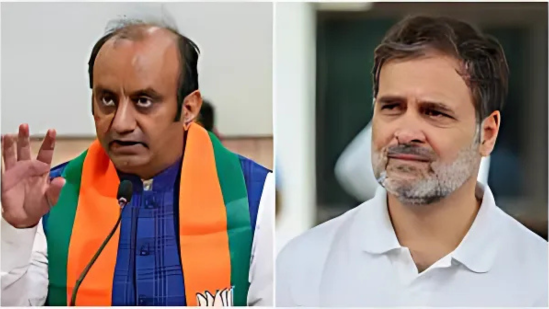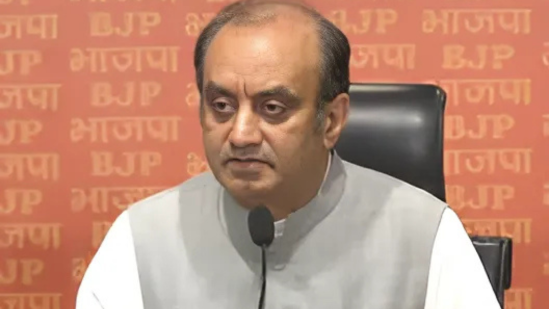
A new political controversy has erupted in India after Congress leader Rahul Gandhi made a sharp comment about Prime Minister Narendra Modi, prompting a strong reaction from the Bharatiya Janata Party (BJP). The situation has sparked heated debate on news channels and social media. BJP spokespersons have condemned the remark, saying that “Even Pakistan-based terrorist Masood Azhar didn’t use such language.”
The incident began when Rahul Gandhi, while speaking at a public rally, took a strong swipe at PM Modi over issues like unemployment, inflation, and crony capitalism. In a dramatic tone, he allegedly used a term or phrase that BJP claims was extremely disrespectful. Although Rahul Gandhi did not directly mention any terrorist names or comparisons, the BJP interpreted his words as crossing a red line in political discourse.
Responding sharply, several senior BJP leaders addressed the media, accusing Rahul Gandhi of using language that not even enemies of India have used for the country’s Prime Minister. BJP national spokesperson Sambit Patra said in a press conference, “Even Masood Azhar, the mastermind of several terror attacks in India, has never used such words for the Indian Prime Minister. Rahul Gandhi’s words are shameful and dangerous.”
This reaction from the BJP has intensified the political tension in the middle of a high-stakes election season. BJP leaders are using this moment to suggest that Rahul Gandhi is disrespecting not just the Prime Minister but the dignity of the post itself. Many of them are also questioning the leadership style of the Congress party, asking why senior Congress leaders remain silent on such remarks.
On the other hand, Congress party leaders have defended Rahul Gandhi, saying that his criticism is directed at Modi’s governance, not at the nation. AICC communications chief Jairam Ramesh responded by saying, “Rahul Gandhi speaks the truth. The BJP cannot digest questions about corruption, inequality, and fake nationalism. They are twisting words to hide their failures.”
The debate over what can and cannot be said in a political speech has taken center stage. Political analysts say this clash is another example of how Indian politics has become increasingly personal and emotional, especially when it involves high-profile leaders like Narendra Modi and Rahul Gandhi. While strong language is not new in Indian politics, comparisons with terrorists and enemies of the state add a new layer of controversy.
Social media platforms like X (formerly Twitter), Instagram, and Facebook have exploded with reactions from both sides. Hashtags like #RahulGandhi, #PMModi, #MasoodAzhar, and #PoliticalDiscourse started trending just hours after the BJP’s press conference. Supporters of both parties are busy sharing clips, memes, and commentary, either condemning or defending the controversial remark.
Political experts believe that such controversies, though unpleasant, are often used strategically during election seasons. Rahul Gandhi’s supporters argue that BJP is using this issue to distract from rising prices and youth unemployment, while BJP supporters say respect for national leaders must be maintained regardless of political rivalry.
What makes this particular case even more interesting is the comparison with Masood Azhar, a globally designated terrorist and the founder of the Jaish-e-Mohammed terror group. Azhar is known for organizing deadly attacks in India, including the 2001 Parliament attack and the Pulwama suicide bombing in 2019. The BJP’s statement linking Rahul Gandhi’s language with Azhar’s conduct is being seen as a serious charge, and possibly an attempt to paint the Congress leader as anti-national.
BJP leaders are now demanding an apology from Rahul Gandhi and asking Congress president Mallikarjun Kharge to clarify the party’s stance. Union Minister Anurag Thakur said, “If Rahul Gandhi does not apologize, it means the Congress party supports such language. Is this their level of political maturity?”
However, many believe that such strong reactions may also backfire, especially among young voters who are tired of mud-slinging politics. They are more interested in hearing about real issues like education, job creation, farmer problems, and climate change rather than heated exchanges.
Journalists covering the political beat have also noted that this is not the first time Rahul Gandhi has made a controversial statement. His past remarks on “suit-boot ki sarkar,” “chowkidar chor hai,” and crony capitalism have often triggered angry reactions from the BJP, but also helped him stay in the media spotlight.
Similarly, PM Modi himself has used sharp words for his political rivals. During election campaigns, he has referred to Rahul Gandhi as “shehzada” (prince) and called the Congress party “a mother-son shop”, raising questions on both sides about the tone and ethics of political speeches.
The Election Commission of India may also step in if the debate escalates. While India’s democracy allows for freedom of speech, all candidates and parties are expected to maintain decorum during election time. The use of sensitive or provocative words can violate the Model Code of Conduct, especially if they affect national security or create social tension.
Meanwhile, public opinion is sharply divided. Some citizens believe Rahul Gandhi’s comment was harsh but justified, given the serious issues facing the country. Others believe that no matter the political disagreement, certain lines must not be crossed, especially when referring to the elected head of government.
A few neutral voices are urging both parties to focus on real issues instead of turning the election into a name-calling contest. Civil society members and retired bureaucrats have issued statements requesting more responsible language from senior leaders.
This controversy also raises broader questions: Can politicians hold each other accountable without using personal attacks? Are strong words necessary to wake up public consciousness? Or do they only weaken democracy by promoting division?
As of now, Rahul Gandhi has not issued any clarification or apology. His team seems focused on continuing the campaign and organizing more public rallies. The BJP, on the other hand, is expected to bring up this issue repeatedly in upcoming interviews and TV debates to gain voter sympathy for PM Modi.
If history is any indication, this controversy may soon be replaced by another one. But it once again proves how words in politics can be powerful, emotional, and explosive—sometimes more than policies and promises.































